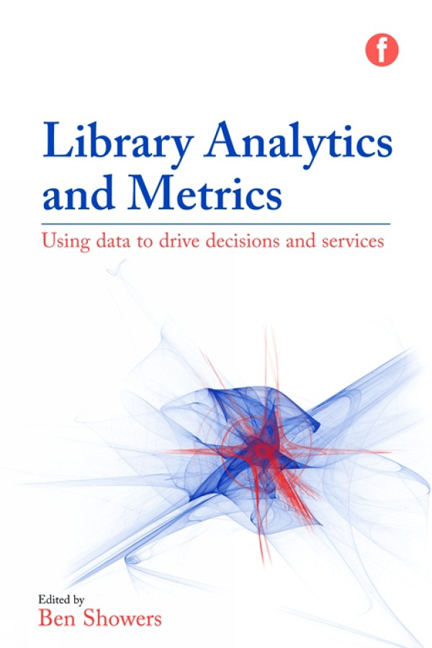Book contents
- Frontmatter
- Dedication
- Contents
- List of figures and tables
- Contributors
- Acknowledgements
- Introduction: getting the measure of analytics and metrics
- 1 Library data: big and small
- 2 Data-driven collections management
- 3 Using data to demonstrate library impact and value
- 4 Going beyond the numbers: using qualitative research to transform the library user's experience
- 5 Web and social media metrics for the cultural heritage sector
- 6 Understanding and managing the risks of analytics
- 7 Conclusion: towards a data-driven future?
- Index
7 - Conclusion: towards a data-driven future?
Published online by Cambridge University Press: 09 June 2018
- Frontmatter
- Dedication
- Contents
- List of figures and tables
- Contributors
- Acknowledgements
- Introduction: getting the measure of analytics and metrics
- 1 Library data: big and small
- 2 Data-driven collections management
- 3 Using data to demonstrate library impact and value
- 4 Going beyond the numbers: using qualitative research to transform the library user's experience
- 5 Web and social media metrics for the cultural heritage sector
- 6 Understanding and managing the risks of analytics
- 7 Conclusion: towards a data-driven future?
- Index
Summary
Data is increasingly digital air: the oxygen we breathe and the carbon dioxide that we exhale. It can be a source of both sustenance and pollution.
(Boyd and Crawford, 2011)There is no escaping it, our future will increasingly be data driven. Data will be the fuel that powers our services and systems. We'll need to be comfortable dealing with the advantages as well as the by-products and unforeseen consequences. We have a chance to begin shaping this future before we find ourselves moulded by it.
There is a sense that we are at a frontier. Our ‘wild west’ is before us, and we are at the start of a push forward. Being analytics pioneers means carving new paths, developing our own tactics and strategies and confronting the challenges present in the landscape, such as the ethical dilemmas with which analytics confronts us. As the chapters and case studies in this book have tried to demonstrate, there are a growing number of experiments and examples that we can begin to learn from and build on, so as to construct our own practices, strategies and frameworks.
As we begin to further explore and settle this new terrain, there are a number of lessons we can take from our case studies to help prepare us for the journey.
We need to put the needs of our users before those of the department. As libraries and cultural heritage institutions we need to re-orientate our precious and limited resources from the back-office, administrative processes and systems to the user- or visitor-facing services. For many of the authors of the case studies in this book, their work on analytics and user data remains a relatively small part of their roles. This must change, in order to ensure that libraries and institutions are able to deliver the kinds of services and experiences which their users expect.
The roles we have in libraries and cultural heritage institutions will evolve. Chapter 4 described the work of researchers and ethnographers working within or closely with libraries to help inform physical and online service development. A number of the case studies describe roles or skill-sets that would be more common in a technology company: user-experience developers, data analysts, information architects, anthropologists and so on.
- Type
- Chapter
- Information
- Library Analytics and MetricsUsing Data to Drive Decisions and Services, pp. 169 - 170Publisher: FacetPrint publication year: 2015



